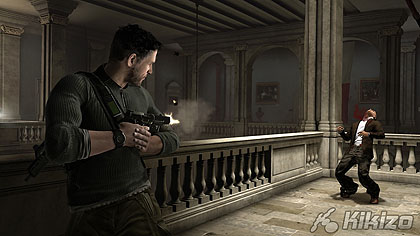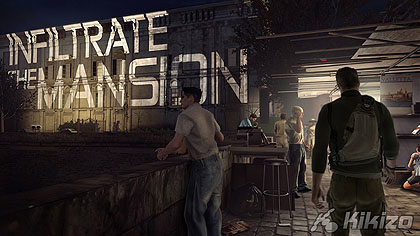Interview: Splinter Cell: Conviction
Sam's lost his stealth suit, but he still walks like a cat. Ubisoft's Steven Masters chats convincingly about Splinter Cell: Conviction.
Page 2
Kikizo: I look at this game, and as a 24 fan I see so many parallels - the daughter premise especially. Are you guys followers of that series, and has it influenced Conviction?
Masters: We have a lot of different influences, everything from Jack Bauer to Jason Bourne, James Bond - the three "JB"s, always a classic - Man on Fire, Taken, lots of different games, lots of different movies. We draw influence from a lot of different places.
Kikizo: Now Sam's off the radar, not taking any orders from the White House or whatever, how does that affect the experience?
Masters: That changes everything. Previously because you were working for Third Echelon, you didn't want to leave any traces, it was all very hush-hush and secret-secret. So you set off the alarm and that's it, it's game over, right? Or you leave a trail of bodies and it gets awkward. But now we unlock all of that. Previously it was a very defensive, passive game - you're always waiting, you're looking, you're studying, you're analysing.
We're now adding an offensive package to that. So you can be much more aggressive, faster, more brutal. Because you're not attached to the agency, you're not following that little voice in your ear all the time, you can basically approach the scenario as you please. If you want to go in guns blazing, you can. If you want to stealth it up, use distractions, draw the guards around and stealth by, you still can. So you still have that stealth route, but you now have an offensive side as well, and it's up to you how to use it.
Kikizo: Right. So what's the thinking behind this being a 360 exclusive?
Masters: Well that's purely a business decision. That's it. [laughs]
Kikizo: So it's nothing to do with the project being native to Xbox 360, and porting to the PS3 being too much hassle - it's entirely a question of business.
Masters: Absolutely, yeah. Ubisoft as a company now has a lot of experience with PS3. Our processes, tools, techniques are very well-developed - we could absolutely execute on the PS3 if we had the opportunity, but like I said it was a business decision.
Kikizo: Going back to darkness and the stealth aspect. That's obviously a big feature of past Splinter Cells - how has it evolved for this iteration?
Masters: We wanted it to be a very clear experience for the player. So when you're in the shadows, you'll notice the screen desaturates and it goes almost black-and-white. We still show you the position of your enemies, they stand out brightly in the environment. So while you're in that you're nearly invisible, and our goal is for Sam to feel more like a panther, basically - he's a predator who can move very quickly, very silently, and take out his enemies really rapidly with a huge amount of surprise.
So light and shadow are still there, still important to the gameplay, but now it's a much cleaner and clearer scenario. You don't have the little graph anymore, you're not studying your detection meter all the time. You know you're in the shadows, and you're practically invisible.







 Satoru Iwata Video Interview - the late Nintendo president spoke with Kikizo in 2004 as 'Nintendo Revolution' loomed.
Satoru Iwata Video Interview - the late Nintendo president spoke with Kikizo in 2004 as 'Nintendo Revolution' loomed. Kaz Hirai Video Interview - the first of Kikizo's interviews with the man who went on to become global head of Sony.
Kaz Hirai Video Interview - the first of Kikizo's interviews with the man who went on to become global head of Sony. Ed Fries Video Interview - one of Xbox's founders discusses an epic journey from Excel to Xbox.
Ed Fries Video Interview - one of Xbox's founders discusses an epic journey from Excel to Xbox. Yu Suzuki, the Kikizo Interview - we spend time with one of gaming's most revered creators.
Yu Suzuki, the Kikizo Interview - we spend time with one of gaming's most revered creators. Tetris - The Making of an Icon: Alexey Pajitnov and Henk Rogers reveal the fascinating story behind Tetris
Tetris - The Making of an Icon: Alexey Pajitnov and Henk Rogers reveal the fascinating story behind Tetris Rare founders, Chris and Tim Stamper - their only interview? Genuinely 'rare' sit down with founders of the legendary studio.
Rare founders, Chris and Tim Stamper - their only interview? Genuinely 'rare' sit down with founders of the legendary studio. The History of First-Person Shooters - a retrospective, from Maze War to Modern Warfare
The History of First-Person Shooters - a retrospective, from Maze War to Modern Warfare